Term 2 Unit 2 | Civics | 7th Social Science - Media and Democracy | 7th Social Science : Civics : Term 2 Unit 2 : Media and Democracy
Chapter: 7th Social Science : Civics : Term 2 Unit 2 : Media and Democracy
Media and Democracy
Unit –II
Media and Democracy
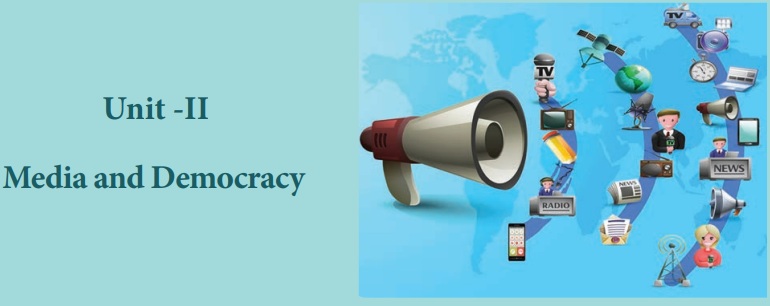
"Let noble thoughts come to us
from every side"
Learning Objectives
•
Understand media and its classification
•
Analyse the role of media in facilitating interaction between the government
and citizen
•
Know the ethic and responsibility of media
•
Gain a critical sense of the impact of media on people’s lives and choices.
Introduction:
Traditionally,
India has many folk form of communicating with people in rural areas.
Harikatha, and koothu are originally a religious media from in which the
stories were propagated. It is a collective form of music, dance, speech, storytelling
with comic interludes. It has tremendous effect in communicating the messages
straight into the hearts of the people. Then socially relevant messages were
passed through this medium. Modern methods to address small and medium
gatherings include seminars, dramas, public meetings and workshops etc. Print
media has been referred to as Peoples University because they perform the role
of public informer, educate and custodian of public interest. Let us discuss
about Media and its role.
What is Media?
Every individual person is a medium
of expression. An individual interacts through the media to reach other
individual and institutions. Media is generally the agency for inter-personal
communication. Media includes every broadcasting and narrowcasting medium.
Media is the plural of the word medium. Such a medium or media allows to
communicate messages, thoughts, ideas, views, etc.
Classification of
Media
Narrowcast Media: Cable Television, Direct mail, Seminar
Broadcast Media: Films, Television, Radio
Print Media: Newspapers, Magazine, Journals, Books, Posters, Reports
Web Media: Google website and Blogs
Social Media: Twitter, Facebook, whatsApp and Instagram
This communication can be classified
into:-
Personal communication – these are meant for personal
use, like letters, telephone, cell phone, E-mail and fax.
Mass communication –these are used for
communicating with the masses. Newspapers, Radio, TV, Collectively they are
termed as media.
Printing press was
invented by Johannes Gutenberg in 1453
Fourth Pillar of
Democracy
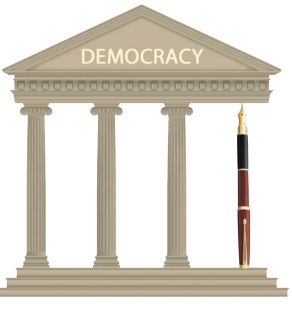
The four pillars of democracy are
Legislature, Executive, Judiciary, and Media. Media ensures the transparency in
the working of all the above three systems. This fourth pillar of democracy
ensures that all people living in far off areas of country are aware of what’s
happening in rest of the country. In fact, mass media is the most important
vehicle for information, knowledge and communication in a democratic polity.
Importance of the
Media
Media
is very powerfulentity onthe earth. It isa mirror whichshowsvarious social,
politicaland economic activitiesaround us. People dependon the media for
various needs including entertainment and information. Media keeps the people
awakened and it has become one of the major instruments of social change. Media
not only bring out the day to day happenings in the world, but also exposes the
strength and weakness of the government. It also advertises the various
products produced by the private companies. It creates the awareness. All the
TV channels broadcasts national and international news. Social problems are
portrayed in many cinemas. Media provide a balanced report on any matters. It
fights against the socio-political evils and injustice in our society while bringing
empowerment to the masses and facilitating development.
All India Radio
(AIR)
Officially known as Akashvani since 1956 (voice from the sky) is
the radio broadcaster of the Government of India launched in 1936.
Media and public
opinion
The media plays a prominent role in
the formation of public opinion (general opinion of the public on particular
issue). It is the powerful tool in contemporary times. It has become a part of
the everyday life of the people. They play a significant role in shaping a person’s
understanding and perception about the events occurred in our daily lives. The
mass media play a significant role in providing honest, intelligent and usually
unbiased accounts of events. The newspaper reflects the response of the people
to the government policies. Thus print media and electronic media helps the
people to express their opinion on important social issues.
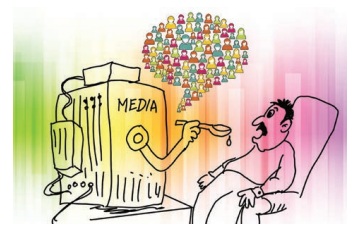
Ethic and
Responsibility
Ethics is a code of values which
govern our lives. So they are very essential for moral and healthy life. In the
context of media ethics may be described as a set of moral principles. The
media is expected to follow a code of conduct which should be reflected in
their reporting and writing. Sensational and distorted news should be avoided.
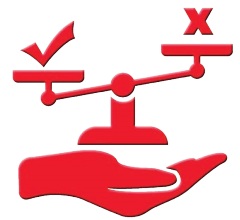
The fundamental objectives of media
are to serve the people with news, views, comments and information on matters
of public interest in a fair, accurate, unbiased and decent manner and
language. An awakened and free media is very much essential for the function of
the government.
It has right to collect information
from any primary authentic sources which are important to the society and then
report the same with the aim to inform not to create sensation. The media has a
massive responsibility in providing factual coverage.
Role of Media in
Democracy
Media is the back bone of democracy.
In our democratic society mass media is the driving force of public opinion.
Media strengthens the democratic value. It enlightens and empowers the people.
It can educate the voters and ensures that government is transparent and
accountable. Media carry every report of action of administration of the
government. Based on the information, the citizen can learn about the functioning
of the government and day to day happenings taking place around them.
Theory of Democracy
Democracy means rule by the people. It combines two Greek words.
Demos refers to citizen. Kratos means either power or rule.
It arranges the debate on current
affairs so that we can get the different views for the same issue. Media
reminds the government of its unfulfilled promises to the public. It educates
masses in rural areas. Parliamentary democracy can flourish only under the
watchful eyes of media. Media not only reports but acts as a bridge between the
state and public. Thus the media acts as a watch day of the democratic
government. A democracy without media is like vehicle without wheel.
Local Media
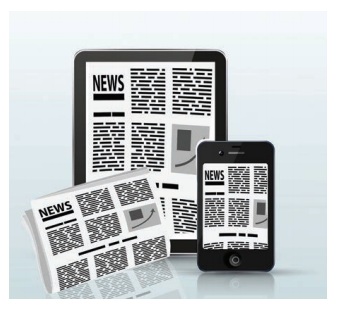
Usualy the media reports the news
which of national and global importance where as local media addresses public
locality.
Name some local media
of your locality.
Conclusion
The media, in the contemporary world
of information and technology plays a very significant role in educating
masses. The media should always keep in mind, that it should not publish
anything which corrupts the public mind and disturbs social peace. For healthy
society sharing of views, free flow of information, free communication and
expression plays a crucial role. Media, being powerful and important
instruments of expression have got lot to contribute. Mass media have made the
world smaller and closer.
Summary
1.
A medium is a means or way of communication; media is the plural of medium.
2.
Modern media such as TV, radio, newspaper, and the internet reach millions of
people all over the world. So the common term used for them is mass media.
3.
Changing technology helps media to reach more people.
4.
Media has brought the world closer to us. It brings the news and happenings
from across the world to the public in a fair and realistic way.
5.
In a democracy, the media plays a very important role in providing news.
6.
It is working out to be an effective tool to create public opinion on issues by
improving awareness among the masses.
Glossary
1. Broadcast: transmit by radio or television ஒளிபரப்பு
2. Polity: system of government ஆட்சி அமைப்பு
3. Contemporary: present –day சமகாலத்தில்
4. Ethics: moral principles நெறிமுறைகள்
5. Unbiased: impartial நடுநிலையான
6. Authentic: genuine/original உண்மயான
Related Topics